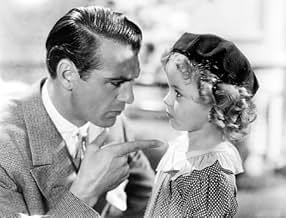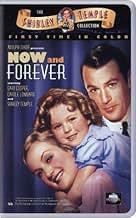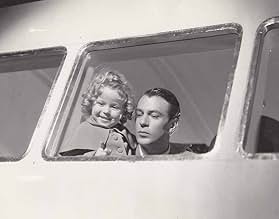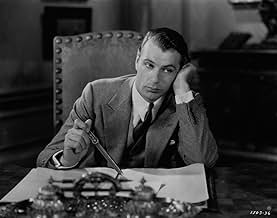IMDb RATING
6.5/10
1.2K
YOUR RATING
A swindler and his girlfriend take in his young daughter, who has been living with the family of his deceased wife.A swindler and his girlfriend take in his young daughter, who has been living with the family of his deceased wife.A swindler and his girlfriend take in his young daughter, who has been living with the family of his deceased wife.
- Awards
- 3 wins total
Guy Standing
- Felix Evans
- (as Sir Guy Standing)
Egon Brecher
- Doctor
- (uncredited)
Luke Chan
- Assistant Hotel Manager
- (uncredited)
André Cheron
- Inspector
- (uncredited)
Ronnie Cosby
- Guest at Penny's Party
- (uncredited)
Kenny Coughlin
- Guest at Penny's Party
- (uncredited)
Carrie Daumery
- Dowager Gambler
- (uncredited)
Sam Harris
- Man at Pool
- (uncredited)
- …
David Holt
- Guest at Penny's Party
- (uncredited)
Richard Loo
- Hotel Clerk
- (uncredited)
Buster Phelps
- Boy With Skates
- (uncredited)
Featured reviews
Gary Cooper stars as Jerry Day, a con man who roams the luxury spots of the world with his girlfriend Toni (Carole Lombard), staying one step ahead of the law and bill collectors. He learns that he has a 6-year old daughter named Penny (Shirley Temple) from a previous relationship. It seems the child's mother has died, but since she was wealthy, Jerry sees a potential payday, so he takes charge of the young girl. However, the child's infectious charm causes Jerry to reassess his lifestyle and change his ways, a decision that may be easier said than done.
I'm not normally a fan of Temple's films, but this outing, in which she's supporting, is much easier to take, even if it is more than a little saccharine. Cooper is good as the morally compromised man trying to change his ways. He's especially effective in the rather dark final act. Temple is Temple, while Lombard doesn't have much to do. Charlotte Granville is enjoyable as a rich old widow who wants to adopt Temple. While the money may be nice, I'm not sure how many years old Charlotte has left in her to be raising a 6-year-old to maturity. I liked this more than expected, and would recommend it to those who have perhaps avoided it due to Temple's presence and a dislike of child centered production code era films.
I'm not normally a fan of Temple's films, but this outing, in which she's supporting, is much easier to take, even if it is more than a little saccharine. Cooper is good as the morally compromised man trying to change his ways. He's especially effective in the rather dark final act. Temple is Temple, while Lombard doesn't have much to do. Charlotte Granville is enjoyable as a rich old widow who wants to adopt Temple. While the money may be nice, I'm not sure how many years old Charlotte has left in her to be raising a 6-year-old to maturity. I liked this more than expected, and would recommend it to those who have perhaps avoided it due to Temple's presence and a dislike of child centered production code era films.
Let us be frank - having decided to view all available pictures with Carole Lombard, I had kept this one for the very end.
Not because of Gary Cooper, though I had feared he would not be a natural match for the sharp wits of Lombard. Actually I was quite wrong about that, he is outstanding in a role of classy spendthrift swindler and irresponsible father. A few years later the role of Jerry Dean would probably have been proposed first to Cary Grant. But in 1934 Grant's impressive dispositions to play such morally dubious characters as Jerry had not yet been fully acknowledged - they would be for example in Hitchcock's Suspicion a few years later -, while on his side Cooper had not yet been typecast as the rather serious and taciturn character he mostly became in the 40s and after.
The main reason for a limited eagerness to see this film, far from being a great fan of child star movies, was Shirley Temple. While the film made progress, there was relief to see that such fears had on the whole been exaggerated. This is not to say that Temple is not "extremely cute", all curls and dimples, as well as "so smart and wise for her age" - the two qualities which seem to have so enthralled the public with her in the 30s, and which can appear rather irritating to (some) modern viewers. She is both these things, a bit too cute, and too smart and wise. But one must recognize that she is not overacting it. More importantly, the film carefully avoids allowing her to steal the whole show. Cooper and Lombard do not simply become satellites around her sun - on the contrary, beyond her, theirs characters and mutual relation become more complex and contradicted than before.
While not a masterpiece the film can be counted as a worthy element in both its stars' careers. It actually starts as pure screwball, very pleasantly so - but even before the appearance of Temple and the levity it brings, trouble looms and the mood starts shifting towards more serious ground. All along, dialogues between Jerry and his wife Toni are far above the lightweight stuff to be usually found in such comedies. The story earns in gravity and interest what it loses in sheer fun. The central thread is highly predictable - will the demands of fatherhood somehow oblige Jerry to give up his self-centered, pleasure-oriented life view and lifestyle ? -, and there cannot be much doubt about the final reply to that question, but both the actual ending and the way to get there are refreshingly unexpected and avoid rather skillfully the pitfalls of heavy-handed moralism - as Toni does. While Carole Lombard plays second fiddle to Cooper's first in the story, her character is fairly developed and rich, and she plays it with perfect pitch.
The year 1934 was when Shirley Temple played three major movies and really began to make a name for herself. Unfortunately, the studios had to experiment to see what the public best liked about here. Two of those things were singing and dancing. Another was a short, interesting film that kept people's attention and got their minds off The Depression. You know the other keys to Shirley's successful films.
This film achieved none of the above, despite the star presences of Gary Cooper and Carole Lombard and despite a very good director in Henry Hathaway. In addition, there are too many talky parts in here which become simply boring, and too many arguments between a sullen Lombard and Cooper. To top it off, you didn't get the normal feel-good ending which is what the public wants. I guess they learned after this movie.
This film achieved none of the above, despite the star presences of Gary Cooper and Carole Lombard and despite a very good director in Henry Hathaway. In addition, there are too many talky parts in here which become simply boring, and too many arguments between a sullen Lombard and Cooper. To top it off, you didn't get the normal feel-good ending which is what the public wants. I guess they learned after this movie.
This movie is well worth viewing, if only to see Gary Cooper and Carole Lombard in relatively early roles and to see Shirley Temple in an unusual part before she really peaked in popularity (here she is an incredible SIX years old). This is not a typical Temple film, in that she sings only one song (expertly), but you do get to see her act in a thoroughly convincing way. The supporting players are excellent as well.
This is a rather odd movie that can't quite make up its mind what to be...a decidedly downbeat ending that is actually starker than it's presented in some reviews here and a series of rather improbable con jobs that are not dramatically convincing. However, it's a treat to see the incredibly talented Temple, the skillful Carole Lombard, and the totally charming Gary Cooper (who, by the way, sports a very impressive wardrobe throughout, as does Lombard).
I watched the colorized version--better than I expected--but would have preferred black and white. See this movie with a "willing suspension of disbelief" and you'll enjoy it as a blast from the long-ago past.
This is a rather odd movie that can't quite make up its mind what to be...a decidedly downbeat ending that is actually starker than it's presented in some reviews here and a series of rather improbable con jobs that are not dramatically convincing. However, it's a treat to see the incredibly talented Temple, the skillful Carole Lombard, and the totally charming Gary Cooper (who, by the way, sports a very impressive wardrobe throughout, as does Lombard).
I watched the colorized version--better than I expected--but would have preferred black and white. See this movie with a "willing suspension of disbelief" and you'll enjoy it as a blast from the long-ago past.
NOW AND FOREVER (Paramount, 1934), directed by Henry Hathaway, based on the story "Honor Bright" by Jack Kirkwood and Melville Baker, stars two-time Academy Award winner Gary Cooper and Carole Lombard, best known for screwball comedies, in a leisurely paced drama made watchable for the early screen presence of little Shirley Temple. While noteworthy as a Temple film, NOW AND FOREVER virtually belongs to the adults, particularly Cooper in an offbeat performance.
The story opens in Shanghai where adventurer Jerome "Jerry" Day (Gary Cooper), along with his traveling companion/wife Toni (Carole Lombard) of three years (whom he constantly asks, "Who do you love?), staying at the Occidental Hotel. Aside from living out of suitcases, catching planes, trains and boats for their next destination, Jerry is also an international crook. Unable to pay his hotel bill, he acquires the cash posing as a hotel auditor from guests whose bills are long overdue. Fully aware of his background, Toni is surprised to learn that Jerry has a child ("For a man who talks so much, you say very little"), living under the guardianship of his late wife Elsie's rich brother (Gilbert Emery) at an estate in Connecticut. Instead of reclaiming his daughter, Jerry decides on making easy money by selling the custody over to him for $75,000. Unable to cope with this situation, Toni decides to remain in Paris while Jerry meets with his brother-in-law and attorney (Henry Kolker). Once Jerry meets with his daughter, Penelopie, better known as Penny (Shirley Temple), whom he hasn't seen since birth, he is touched by the child and takes her away with him. After sailing back to Paris, Jerry introduces Penny to Toni as her new mother. All goes well, with Jerry now earning an honest living as agent for Rivera Realty Company, until he meets up with Felix Evans (Sir Guy Standing), an elderly gentleman to whom he sold a phony gold mine for $5,000 while with Penny in New York. Being a crook himself, Felix let Jerry swindle him in order to blackmail him into stealing a valuable necklace belonging to Mrs. J.H.P. Crane (Charlotte Granville), a wealthy widow whom Penny has already befriended. Further complications arise for Jerry as Mrs. Crane, who senses his adventurous ways, wanting to adopt Penny in order to give her a better life than her father ever could.
NOW AND FOREVER became Temple's second and final loan-out assignment from her home base at Fox Studios, her first being LITTLE MISS MARKER (1934). Although both films are equal to the point of having its opening credits orchestrated to the score of "Laugh, You Son-of-a-Gun," LITTLE MISS MARKER has proved more favorable by today's standards than NOW AND FOREVER in spite its top name cast of Cooper and Lombard. Temple has little screen time with Lombard, but gets the most out of playing opposite the extremely tall Cooper as well as the elderly co-stars of Charlotte Granville (giving an Alison Skipworth-type performance) and Sir Guy Standing. Temple's most crucial scene occurs while crying after discovering Mrs. Crane's necklace hidden in her teddy bear, believing "Daddy" had stolen it, even worse after swearing "honor bright" to her that he didn't. This is followed by a touching scene of forgiveness with daughter kissing Daddy. Take notice that the portion where society woman wanting to adopt child was reworked into Temple's latter film, DIMPLES (20th-Fox, 1936) with Helen Westley as the matron and Frank Morgan as Temple's petty thief grandfather.
As much as Temple is seldom seen mixing with other children on screen, she gets an opportunity enacting briefly opposite Ronnie Cosbey as the little boy by the poolside with whom she trades roller skates, as well as entertaining children guests attending Mrs. Crane's dinner party by singing, sneezing and stomping her feet to the tune of "The World Owes Me a Living" (by Harry Revel and Mack Gordon).
Of all the Temple features produced from 1934 to 1940, NOW AND FOREVER appeared to be the only one not part of any Shirley Temple Film Festivals on commercial television during the 1960s and 70s. The movie did air regularly on television in the New York City area on WNEW, Channel 5 prior to 1979, usually during the mid morning or after midnight hours possibly for its theme being more adult than one appealing to children. There's even gun shooting involved, not typically found in Temple's family oriented films. For many years, NOW AND FOREVER had virtually disappeared from view, making this and her 20th-Fox 1940 musical YOUNG PEOPLE the only hold-outs on VHS and DVD formats until the late 1990s when both distributed on VHS colorized formats. Cable television showings have been elusive for NOW AND FOREVER until making its Turner Classic Movies premiere July 6, 2015, as part of its "Star of the Month" tribute to the one and only Shirley Temple.
In spite of script weakness, NOW AND FOREVER remains of sole interest due to its principal players early in their careers, particularly Temple, whose popularity remains legendary, now and forever. Honor bright. (***)
The story opens in Shanghai where adventurer Jerome "Jerry" Day (Gary Cooper), along with his traveling companion/wife Toni (Carole Lombard) of three years (whom he constantly asks, "Who do you love?), staying at the Occidental Hotel. Aside from living out of suitcases, catching planes, trains and boats for their next destination, Jerry is also an international crook. Unable to pay his hotel bill, he acquires the cash posing as a hotel auditor from guests whose bills are long overdue. Fully aware of his background, Toni is surprised to learn that Jerry has a child ("For a man who talks so much, you say very little"), living under the guardianship of his late wife Elsie's rich brother (Gilbert Emery) at an estate in Connecticut. Instead of reclaiming his daughter, Jerry decides on making easy money by selling the custody over to him for $75,000. Unable to cope with this situation, Toni decides to remain in Paris while Jerry meets with his brother-in-law and attorney (Henry Kolker). Once Jerry meets with his daughter, Penelopie, better known as Penny (Shirley Temple), whom he hasn't seen since birth, he is touched by the child and takes her away with him. After sailing back to Paris, Jerry introduces Penny to Toni as her new mother. All goes well, with Jerry now earning an honest living as agent for Rivera Realty Company, until he meets up with Felix Evans (Sir Guy Standing), an elderly gentleman to whom he sold a phony gold mine for $5,000 while with Penny in New York. Being a crook himself, Felix let Jerry swindle him in order to blackmail him into stealing a valuable necklace belonging to Mrs. J.H.P. Crane (Charlotte Granville), a wealthy widow whom Penny has already befriended. Further complications arise for Jerry as Mrs. Crane, who senses his adventurous ways, wanting to adopt Penny in order to give her a better life than her father ever could.
NOW AND FOREVER became Temple's second and final loan-out assignment from her home base at Fox Studios, her first being LITTLE MISS MARKER (1934). Although both films are equal to the point of having its opening credits orchestrated to the score of "Laugh, You Son-of-a-Gun," LITTLE MISS MARKER has proved more favorable by today's standards than NOW AND FOREVER in spite its top name cast of Cooper and Lombard. Temple has little screen time with Lombard, but gets the most out of playing opposite the extremely tall Cooper as well as the elderly co-stars of Charlotte Granville (giving an Alison Skipworth-type performance) and Sir Guy Standing. Temple's most crucial scene occurs while crying after discovering Mrs. Crane's necklace hidden in her teddy bear, believing "Daddy" had stolen it, even worse after swearing "honor bright" to her that he didn't. This is followed by a touching scene of forgiveness with daughter kissing Daddy. Take notice that the portion where society woman wanting to adopt child was reworked into Temple's latter film, DIMPLES (20th-Fox, 1936) with Helen Westley as the matron and Frank Morgan as Temple's petty thief grandfather.
As much as Temple is seldom seen mixing with other children on screen, she gets an opportunity enacting briefly opposite Ronnie Cosbey as the little boy by the poolside with whom she trades roller skates, as well as entertaining children guests attending Mrs. Crane's dinner party by singing, sneezing and stomping her feet to the tune of "The World Owes Me a Living" (by Harry Revel and Mack Gordon).
Of all the Temple features produced from 1934 to 1940, NOW AND FOREVER appeared to be the only one not part of any Shirley Temple Film Festivals on commercial television during the 1960s and 70s. The movie did air regularly on television in the New York City area on WNEW, Channel 5 prior to 1979, usually during the mid morning or after midnight hours possibly for its theme being more adult than one appealing to children. There's even gun shooting involved, not typically found in Temple's family oriented films. For many years, NOW AND FOREVER had virtually disappeared from view, making this and her 20th-Fox 1940 musical YOUNG PEOPLE the only hold-outs on VHS and DVD formats until the late 1990s when both distributed on VHS colorized formats. Cable television showings have been elusive for NOW AND FOREVER until making its Turner Classic Movies premiere July 6, 2015, as part of its "Star of the Month" tribute to the one and only Shirley Temple.
In spite of script weakness, NOW AND FOREVER remains of sole interest due to its principal players early in their careers, particularly Temple, whose popularity remains legendary, now and forever. Honor bright. (***)
Did you know
- TriviaShirley Temple memorized every line of dialogue in this movie, and whenever Gary Cooper forgot or fumbled his lines, Temple prompted him, much to Cooper's annoyance.
- GoofsWhen Penny asks Jerry for his name, she mouths his answer at the same time he says it. Shirley Temple probably did this to stay synchronized for her next line.
- Quotes
Jerry Day: Toni, don't get one thing wrong. I still love you.
Toni Carstairs Day: You don't need to say anything because there isn't anything left to say. If you'd even told me - but lying. You've lost your size, Jerry, and I could never chase trains with a little man.
Jerry Day: Toni, I do love you.
Toni Carstairs Day: That's very sweet, but I'm afraid we've missed the train.
- ConnectionsFeatured in The Love Goddesses (1965)
- SoundtracksThe World Owes Me a Living
(uncredited)
Music by Leigh Harline
Lyrics by Larry Morey
Sung by Shirley Temple
- How long is Now and Forever?Powered by Alexa
Details
- Runtime1 hour 21 minutes
- Color
- Aspect ratio
- 1.37 : 1
Contribute to this page
Suggest an edit or add missing content


































